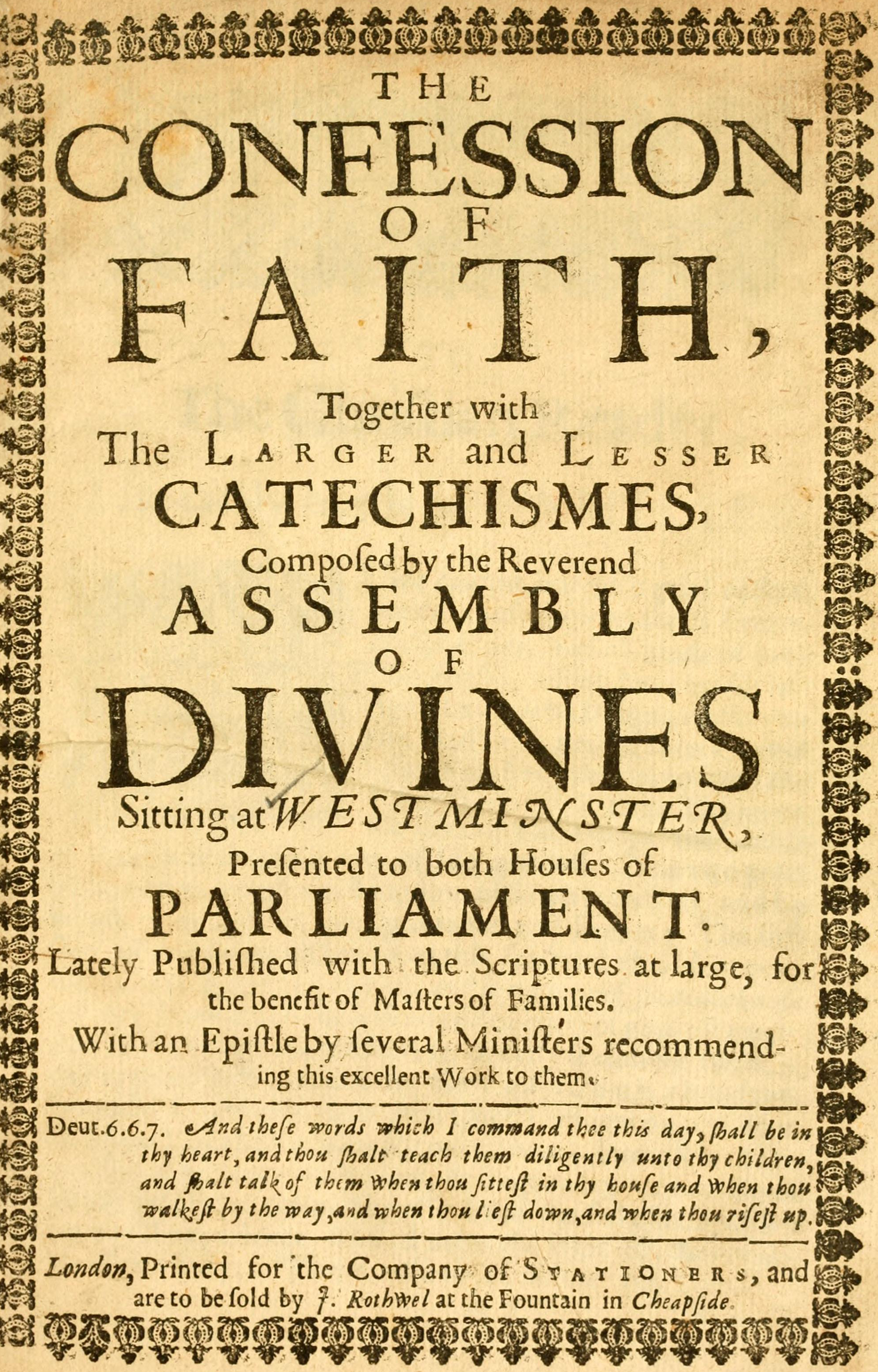Westminster Standards on:
[Wikipedia]
[Google]
[Amazon]
 The Westminster Standards is a collective name for the documents drawn up by the
The Westminster Standards is a collective name for the documents drawn up by the
 The Westminster Standards is a collective name for the documents drawn up by the
The Westminster Standards is a collective name for the documents drawn up by the Westminster Assembly
The Westminster Assembly of Divines was a council of divines (theologians) and members of the English Parliament appointed from 1643 to 1653 to restructure the Church of England. Several Scots also attended, and the Assembly's work was adopt ...
(1643–49). These include the Westminster Confession of Faith
The Westminster Confession of Faith is a Reformed confession of faith. Drawn up by the 1646 Westminster Assembly as part of the Westminster Standards to be a confession of the Church of England, it became and remains the "subordinate standard" o ...
, the Westminster Shorter Catechism
The Westminster Shorter Catechism is a catechism written in 1646 and 1647 by the Westminster Assembly, a synod of English and Scottish theologians and laymen intended to bring the Church of England into greater conformity with the Church of Sco ...
, the Westminster Larger Catechism, the Directory of Public Worship
The ''Directory for Public Worship'' (known in Scotland as the ''Westminster Directory'') is a liturgical manual produced by the Westminster Assembly in 1644 to replace the ''Book of Common Prayer''. Approved by the Parliament of England in 16 ...
, and the Form of Church Government, and represent the doctrine and church polity of 17th-century English and Scottish Presbyterianism
Presbyterianism is a part of the Reformed tradition within Protestantism that broke from the Roman Catholic Church in Scotland by John Knox, who was a priest at St. Giles Cathedral (Church of Scotland). Presbyterian churches derive their n ...
. The Westminster Confession of Faith and Larger and Shorter Catechism have been adopted as doctrinal standards by a number of Reformed and Presbyterian Christian denominations.
Following the approval of the Confession and catechisms by the Church of Scotland
The Church of Scotland ( sco, The Kirk o Scotland; gd, Eaglais na h-Alba) is the national church in Scotland.
The Church of Scotland was principally shaped by John Knox, in the Reformation of 1560, when it split from the Catholic Church ...
in 1648, printers in England and Scotland began publishing them with other religious documents in collections referred to as the Westminster Standards. In 1658 printers began including the full Scripture passages which are cited in the confessional documents. These collections became standardized in a 1728 edition, which follows a 1679 work published by Covenanter
Covenanters ( gd, Cùmhnantaich) were members of a 17th-century Scottish religious and political movement, who supported a Presbyterian Church of Scotland, and the primacy of its leaders in religious affairs. The name is derived from '' Covena ...
s exiled in Holland
Holland is a geographical regionG. Geerts & H. Heestermans, 1981, ''Groot Woordenboek der Nederlandse Taal. Deel I'', Van Dale Lexicografie, Utrecht, p 1105 and former Provinces of the Netherlands, province on the western coast of the Netherland ...
and contains twenty-two documents including parliamentary acts related to the Assembly and devotional works. These collections were intended to serve as ecclesiastical manuals as well as comprehensive popular religious books. The 1728 form of the Standards continues to be printed by the Free Presbyterian Church of Scotland
The Free Presbyterian Church of Scotland ( gd, An Eaglais Shaor Chlèireach, ) was formed in 1893. The Church identifies itself as the spiritual descendant of the Scottish Reformation. The Church web-site states that it is 'the constitutional he ...
.
In the nineteenth century, several churches separated from the Church of Scotland on the basis of the established church's departure from a list of documents similar to those found in standard collections of the Westminster Standards. Dissenters asserted that the General Assembly had adopted these documents, but the only Westminster documents accepted by the Church of Scotland were the Confession and catechisms.
See also
*Three Forms of Unity
The Three Forms of Unity is a collective name for the Belgic Confession, the Canons of Dort, and the Heidelberg Catechism, which reflect the doctrinal concerns of continental Calvinism and are accepted as official statements of doctrine by many Ca ...
References
Sources
* * * 17th-century Christian texts Westminster Assembly Church of Scotland {{calvinism-stub